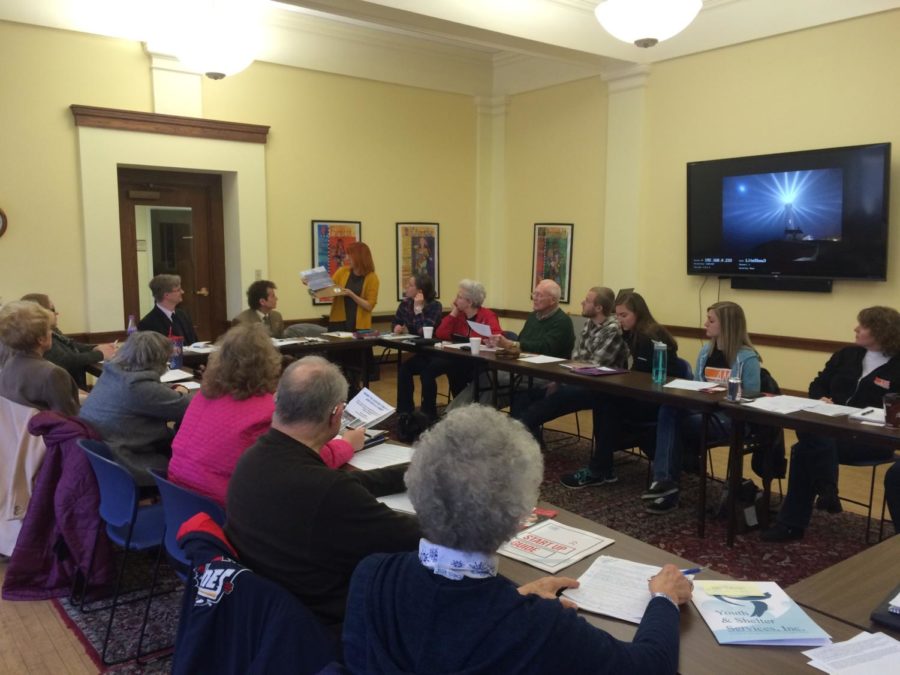Human Trafficking Prevention Month raises awareness
Danielle Ferguson/Iowa State Daily
The Central Iowa Network Against Human Trafficking met Friday, Jan. 23, at the Jacobson building to discuss how the group is going to address the issue of trafficking minority children in the midwest and create legislation that is human-trafficking sensitive.
January 27, 2016
America is called the land of the free, but there are some people living in this country who are not.
The 13th Amendment abolished slavery in the United States of America in 1865. However, according to Allies Against Slavery, there are currently between 21 and 30 million people trapped within the horrors of the modern form of slavery all over the world, including in the United States.
This modern-day slavery is better known as human trafficking.
It is easy to assume that the problem lies in countries across the globe, but in reality that is not the case. In fact, the United States is one of the largest stops for human trafficking in the world.
Los Angeles, San Fransisco and San Diego are three of the cities with the most sex trafficking, according to Californians Against Sexual Exploitation (CASE), a nonpartisan organization dedicated to ending human trafficking.
Teresa Downing-Matibag, lecturer in sociology, said the United States is among the worst countries in regards to this issue.
“The most shocking thing about human trafficking in the U.S. is that our citizens are among the world’s worst offenders in the area of sex trafficking and many of our corporations fail to check their supply chains for labor trafficking,” Downing-Matibag said. “If our nation is to stand as a model of freedom and beacon of hope for the world, we need to stop these outrageous forms of exploitation by our own citizens first.”
Human trafficking in its many forms is a huge money-making trade. Criminals in the human trafficking business profit around $150 billion every year at the expense of the slavery of other human beings, according to End Crowd, an organization dedicated to ending slavery worldwide.
The main types of human trafficking are sex trafficking, forced labor and debt bondage. Someone falls victim to one of these forms of slavery every 30 seconds, according to End Crowd.
George Belitsos, founder of Youth and Shelter Services and current chairman of Iowa Network Against Human Trafficking, said child sex trafficking is the most prominently seen form of human trafficking in Iowa.
“Most of the sex-trafficked minors in Iowa have been runaways and homeless, within 48 hours of becoming homeless or a runaway,” Belitsos said. “One out of four of those minors come in contact with traffickers. Last year in Iowa there were just over 4,000 runaways.”
National Slavery and Human Trafficking Prevention month is meant to raise awareness to the fact that human trafficking is real and the industry is growing in the United States and in many other countries.
Although the amount of human trafficking in the United States is increasing, there are changes being made. The Iowa Network Against Human Trafficking works with different agencies throughout Iowa to find solutions.
National attention has added momentum on the issue. President Barack Obama made a proclamation on Dec. 31, 2015 that dubbed January as National Slavery and Human Trafficking Prevention month.
The media has helped to promote awareness of human trafficking. The recent movie “The Room” has been nominated for several awards and brings awareness to sex trafficking. The movie features a woman and her son fighting to escape the world of sex slavery.
ISU students can join ISU-Network Against Human Trafficking, where they can advocate for the use of slavery-free goods only.
By logging onto Slavery Footprint, students can learn how to change their consumption choices.
Not only is National Slavery and Human Trafficking Prevention month meant to prevent individuals from falling into human trafficking, but it is also meant to find and prosecute perpetrators of the act and to help put back together the lives of those who have gotten out of human trafficking’s grasp.
“As organizations build momentum in the area of awareness raising, community members come forward to ask how they can assist in preventing this crime and providing support to survivors,” Downing said.

















